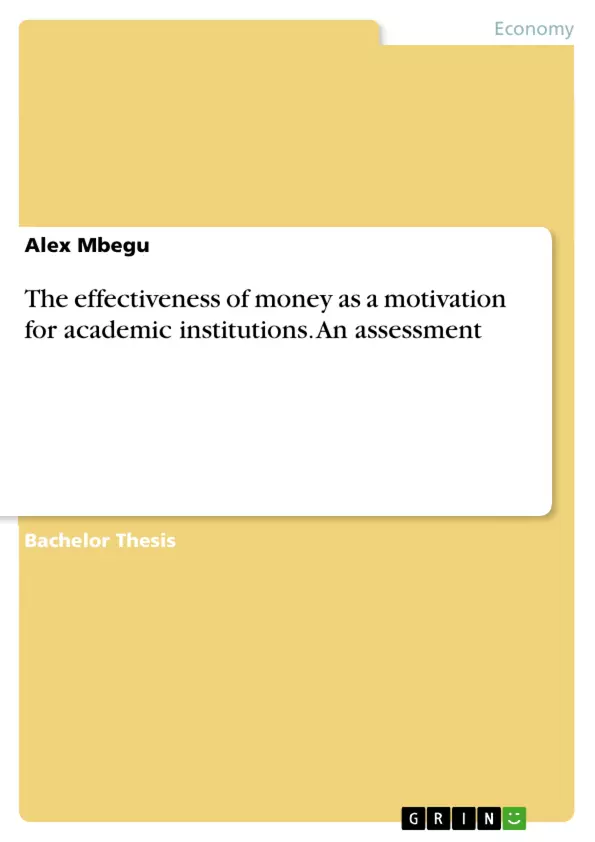Employee motivation was defined by Torrington (2008) as “an effort or drive that an individual puts into an activity”. This research paper investigated the effectiveness of money as motivator for academic staff in higher learning institutions.
The subjects of the study were 26 workers of Tumaini University Dar es Salaam College, the subjects were divided into two groups; senior management and academic staff. 25 questionnaires were issued to academic staff and an interview was conducted with the principal human resource officer. In spite of other relevant theories, the study was keenly guided by the Herzberg two-factor theory that argued “trying to use money is an inferior way to motivate an employee”.
Quantitative and qualitative techniques of data analysis were employed. The findings of the study revealed that the effectiveness of money as motivator for academic staff was limited or affected by some motivating factors and not affected or unlimited by others. In the concern of the implications, the limitations and suggestions for future research studies, they are discussed in the final chapter.
Inhaltsverzeichnis (Table of Contents)
- Introduction
- Background of the Study
- Statement of the Problem
- Purpose of the Study
- Research Questions
- Objectives of the Study
- Significance of the Study
- Scope of the Study
- Limitations of the Study
- Definition of Terms
- Literature Review
- Conceptual Framework
- Theoretical Framework
- Empirical Review
- Research Methodology
- Research Design
- Population and Sample
- Sampling Techniques
- Data Collection Techniques
- Data Analysis Techniques
- Presentation and Analysis of Data
- Demographic Characteristics of Respondents
- Findings of the Study
- Discussion of Findings
- Conclusions and Recommendations
Zielsetzung und Themenschwerpunkte (Objectives and Key Themes)
This research paper examines the effectiveness of financial incentives as a motivator for academic staff in higher education institutions, specifically focusing on Tumaini University Dar-es-Salaam College (TUDARCO). The study aims to understand how monetary rewards impact the motivation and performance of academic staff, considering various factors that influence their work satisfaction and commitment.
- The role of financial incentives in motivating academic staff.
- The impact of other motivating factors, such as recognition, professional development, and job satisfaction, on academic staff.
- The application of Herzberg's two-factor theory in understanding the effectiveness of financial incentives as a motivator.
- The relationship between motivation and employee performance in the academic context.
- The limitations of using financial incentives as the primary motivator for academic staff.
Zusammenfassung der Kapitel (Chapter Summaries)
- Introduction: This chapter sets the stage for the research, outlining the background, problem statement, purpose, research questions, objectives, significance, scope, limitations, and definition of key terms.
- Literature Review: This chapter provides a comprehensive review of existing literature on employee motivation, focusing on financial incentives and their impact on academic staff. It also explores relevant theories and empirical studies.
- Research Methodology: This chapter outlines the research design, population and sample selection, data collection techniques, and data analysis methods employed in the study.
- Presentation and Analysis of Data: This chapter presents the findings of the research, including demographic characteristics of respondents and the results of data analysis.
- Discussion of Findings: This chapter analyzes and interprets the findings, drawing connections between the research findings and existing literature, and providing insights into the effectiveness of financial incentives as a motivator for academic staff.
Schlüsselwörter (Keywords)
Employee motivation, financial incentives, higher education institutions, academic staff, Herzberg's two-factor theory, Tumaini University Dar-es-Salaam College, performance, job satisfaction, recognition, professional development.
Frequently Asked Questions
Is money an effective motivator for academic staff?
The research indicates that while money is important, its effectiveness as a motivator for academic staff is limited and often secondary to factors like job satisfaction and professional recognition.
What is Herzberg's two-factor theory?
Herzberg's theory distinguishes between "hygiene factors" (like salary), which prevent dissatisfaction but don't motivate, and "motivators" (like achievement and recognition), which create true satisfaction.
What other factors motivate university employees besides salary?
Key motivators identified include professional development opportunities, recognition for research and teaching, and a supportive work environment.
How was the study at Tumaini University conducted?
The study used both quantitative (questionnaires for 25 academic staff) and qualitative (interview with a human resource officer) methods to assess motivation factors.
Does higher pay lead to better academic performance?
The findings suggest that financial incentives alone are insufficient to guarantee high performance if other motivating needs, such as autonomy and recognition, are not met.
- Citation du texte
- Alex Mbegu (Auteur), 2016, The effectiveness of money as a motivation for academic institutions. An assessment, Munich, GRIN Verlag, https://www.grin.com/document/343504



